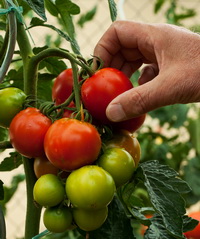|
|
|
|
|
|
Development of Powdery Mildew Resistant Tomato via CRISPR-Cas9 |
 In tomato (Solanum lycopersicum), there are sixteen Mlo genes, with SlMlo1 being the major contributor to the susceptibility to the powdery mildew caused by Oidium neolycopersici. Natural loss-of-function slmlo1 mutants are available in tomato, however, introgression of such mutations is a lengthy process. The team of Vladimir Nekrasov from the Sainsbury Laboratory, Norwich Research Park in the UK aimed to generate a transgene-free genetically edited slmlo1 tomato using the CRISPR-Cas9 system. In tomato (Solanum lycopersicum), there are sixteen Mlo genes, with SlMlo1 being the major contributor to the susceptibility to the powdery mildew caused by Oidium neolycopersici. Natural loss-of-function slmlo1 mutants are available in tomato, however, introgression of such mutations is a lengthy process. The team of Vladimir Nekrasov from the Sainsbury Laboratory, Norwich Research Park in the UK aimed to generate a transgene-free genetically edited slmlo1 tomato using the CRISPR-Cas9 system.
|
|
|
|
|
|
|

|
A biweekly update on gene editing research, regulations, and impact
produced by ISAAA Inc. |
| |
|
|

|
| A monthly update on gene drive research and development provided by ISAAA in collaboration with the Outreach Network for Gene Drive Research |
| |
|
|
|
|
GM APPROVAL UPDATES |
- The Philippines approved the canola event LBFLFK for food, feed, and processing.
- The Philippines approved the cotton event GFM cry1A for commercial cultivation.
- Brazil approved the wheat event HB4 for commercial cultivation.
- The Philippines approved the soybean event GMB 151 for food, feed, and processing.
- The Philippines approved the eggplant event EE-1 for cultivation
- The USA approved the canola event MON94100 for food and feed.
|
|
|
|
| Biotech Updates is a weekly newsletter of ISAAA, a not-for-profit organization. It is distributed for free to over 22,000 subscribers worldwide to inform them about the key developments in biosciences, especially in biotechnology. Your support will help us in our mission to feed the world with knowledge. You can help by donating as little as $10. |
|
|
|
|